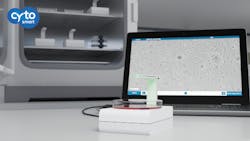CytoSMART to donate 100 live-cell imagers to assist COVID-19 researchers
CytoSMART Technologies (Eindhoven, The Netherlands) will donate 100 mini live-cell imaging systems to researchers in high containment labs working to combat COVID-19. The company aims to reduce the huge workload currently facing researchers on projects vital to controlling the disease.
“We aim to do our part to assist researchers in minimizing the time they have to spend in high-contamination labs, by providing them with remote video access to evaluate the status of their cell cultures. The video data is used to remotely monitor the cytopathic effect--this way, researchers know when it’s the right time to harvest the virus,” says Joffry Maltha, CEO at CytoSMART Technologies.
According to guidelines by the CDC and the WHO, isolation and characterization of COVID-19 should be performed in BSL-3 laboratories. Performing research in Biosafety Level 3 and 4 laboratories (BSL-3 or BSL-4) means working in a highly controlled area. Many precautionary measures must be taken to ensure the safety of researchers and help prevent the diseases they are working with from spreading outside the lab. Removing and replacing the protective clothing and apparatus can be time-consuming and expensive, so entering the lab should ideally only occur when absolutely necessary.
CytoSMART’s compact live-cell microscope films living cell cultures without disturbing their growth or behavior. The device operates from inside cell culture incubators and is accessible from an online environment. This enables researchers to analyze their cell cultures remotely and assess, for example, the cytopathic effect, which is caused by virus replication. Using the CytoSMART Lux2, researchers will know when to take action for the next step and harvest the virus.
Laboratories are welcome to apply for a Lux2 live-cell imager.
